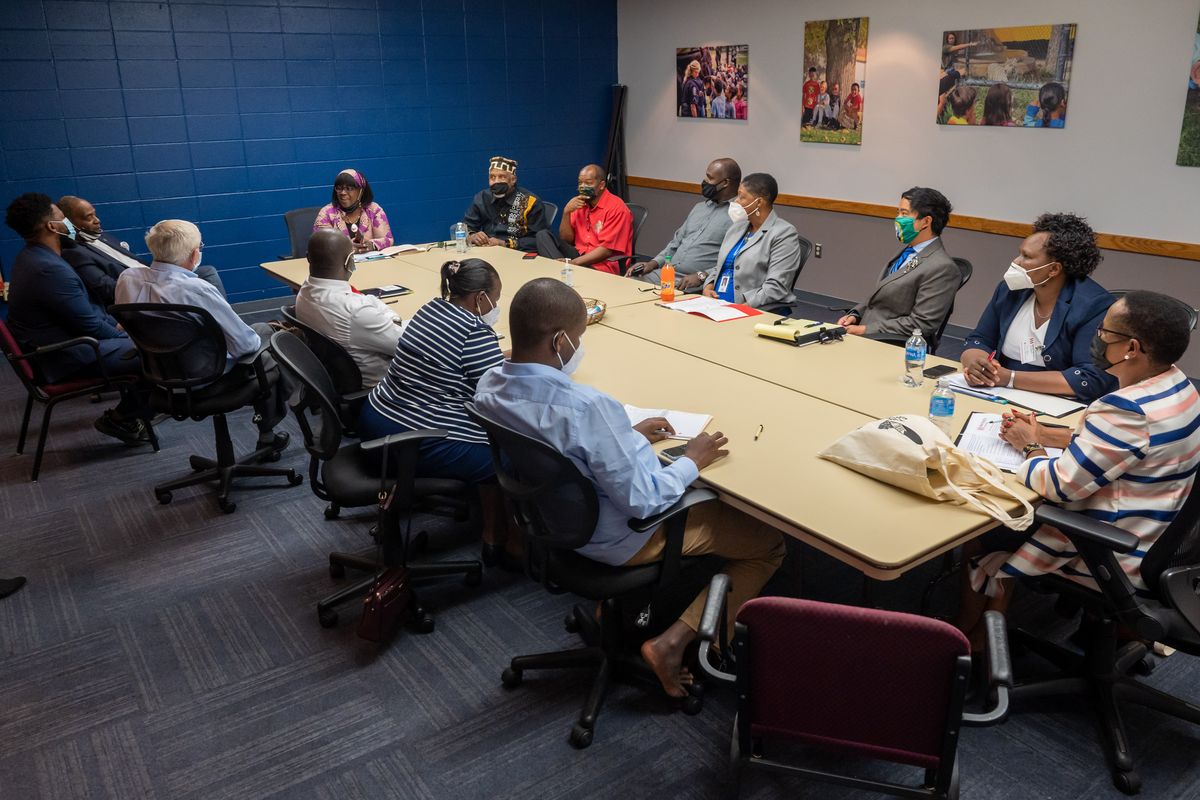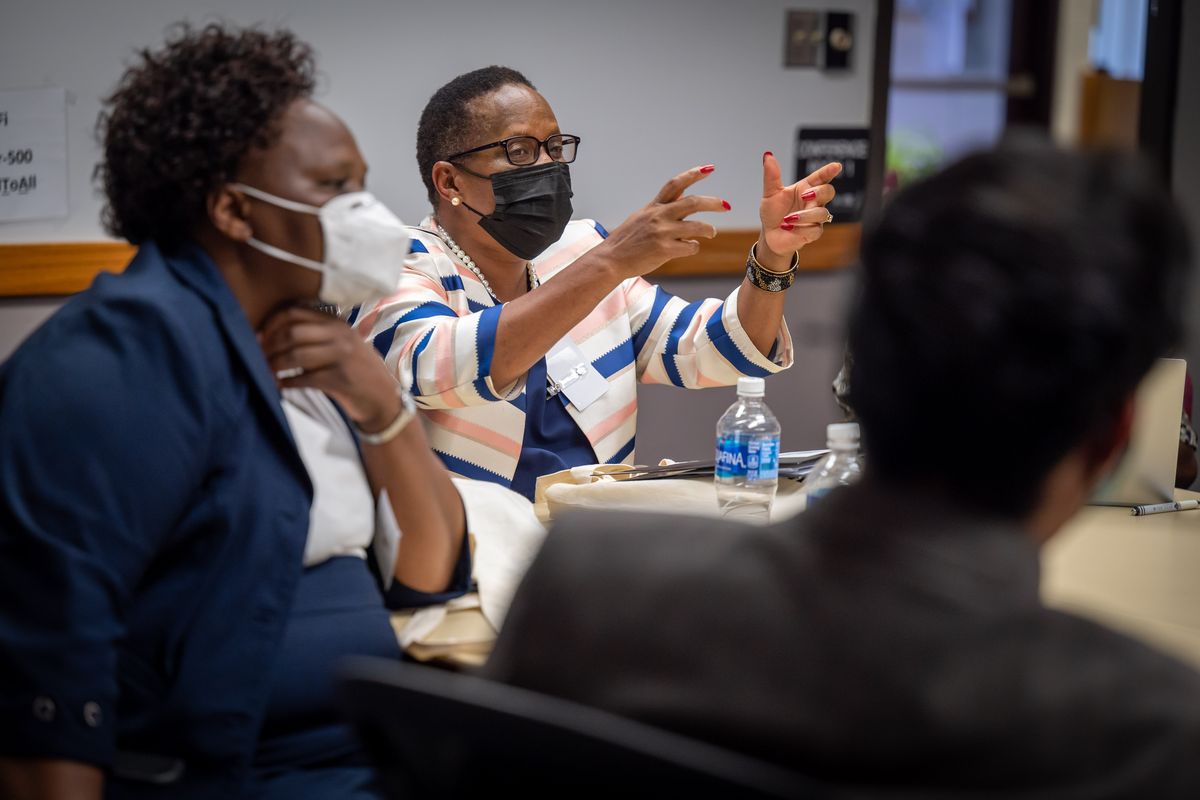‘Mutual understanding’: Kenyan officials visiting Spokane meet with Black, Indigenous community leaders
The Kenyan Parliamentarians of the National Cohesion Integration Commission met with Spokane's Black and Indigenous community leaders to engage in talks of diversity, equity and inclusion in policy, media and community endeavors, Tuesday, Sept. 14, 2021, at the East Central Community Center. (COLIN MULVANY/THE SPOKESMAN-REVI)
Spokane is a small, predominately white city of only about a quarter-million people. Kenya is an African nation of 54 million people on the other side of the world.
Though labels and cultural practices may differ, groups from the two countries found common ground during a meeting Tuesday on their respective quests for equality.
Honorable Janet Wangabo Wanyama, Honorable David Ochieng, Honorable Maison Leshoomo, Honorable Judith Nayiai Pareno and Mr. Abdifatah Bule are members of Kenya’s parliament. They also are part of the National Cohesion Integration Commission, a group established in the wake of “election violence, unearthing deep social cleavages within the Kenyan society,” after Mwai Kibaki, a member of the Party of National Unity was elected president in 2007.
The members represent diverse sectors of Kenyan life such as agriculture, theology and government affairs.
The commission was established under the National Cohesion and Integration Act No. 12 to address national issues of ethnic, racial and religious violence and discrimination.
In a country like Kenya, where the population is racially homogeneous, ethnic and tribal differences are barriers to national unity.
Members of the commission selected Whitworth University because of its implementation of diversity, equity and inclusion. Former professor John Yoder was an African studies specialist and made connections with Kenyan officials before retiring.
Whitworth’s Roberta J. Wilburn has been the liaison for the parliament and the Spokane community with the help of Yoder and another African studies professor, Megan Hershey. Wilburn, Whitworth’s associate vice president, also serves as the interim chief diversity officer. She said the Kenya parliament visit is an “important example” of what diversity, equity and inclusion work can look like.
“A key to diversity, equity and inclusion work is building heart and soul connections with people from other cultures,” Wilburn said.
“That’s how you promote cross-cultural understanding. We have to promote mutual understanding, and that’s something that I’ve been emphasizing the whole time we’ve been together.”
On Tuesday, Spokane City Council member Betsy Wilkerson, Spokane Public School board president Jerrall Haynes and Pastor Walter Kendricks, who is also part of the Spokane Community Against Racism organization, met with the parliament members at the MLK Community Center. Shon Davis and James Wilburn Jr., who work in the school district, were also on the panel.
The discussion aimed to identify community problems, provide potential solutions and evaluate past efforts and their effectiveness as Black leaders in Spokane.
Throughout the conversation, the Spokane community panelists spoke about their personal experiences as minorities and how their work has changed Spokane’s discriminatory systems.
Working from within Spokane Public Schools, Davis, Wilburn and Haynes explained their work to level the playing field for Spokane’s students of color. Davis spoke of his actions to reverse the suspensions of four Black female students whose hand gestures were mistaken by a white teacher as “aggressive.” Wilburn, once an achievement gap intervention specialist for Ferris and Lewis and Clark high schools, reflected on how his revised approach to students performing poorly helped raise African American graduation rates from 51 to 74%.
Haynes discussed the current changes he’s made as the first Black president of Spokane Public School Board.
“We’re arresting less than 100 students a year, and we’ve hit an all-time high for graduation rates for students of color three years in a row now,” Haynes said.
Though the labels and cultural practices may differ, the two groups found similarities in their everyday life. As the Kenyans explained the function of nongovernment organizations, Spokane community members spoke to America’s nonprofit organizations. While Wilkerson discussed the challenges of running for City Council as a Black woman in Spokane, Pareno of the Orange Democratic Movement explained the different parties of Kenya’s parliament, Congress and voting rights for nominated senators.
“Each (political) party can nominate a member according to how you have performed,” Pareno said. “Nominated senators like me don’t have voting rights, but we can delegate. I’m unable to vote, but we’re fighting for that right.”
The group discussed other societal issues, like Kenyan women wanting more representatives in parliament in a male-dominated society, but many of them resigned to follow tradition and get married.
For Spokane, the racial wage gap can prevent community members of color from political campaigns.
The Kenyan parliament members will be in Spokane through the week.
Wednesday, they are scheduled to discuss forced cultural assimilation, fishing rights and police, and Native legal norms, with Indigenous leaders from the region.
Later in the day, they are planning to meet with Mayor Nadine Woodward and other city leaders to discuss homelessness and refugees.
“This is a rare opportunity, and for Whitworth to host such dignitaries as a historically predominate white school, I think it was very significant and worth it. I’ve been so pleased that the Spokane community has rallied around to be involved,” Wilburn said.

